Good morning everyone! If you are new, welcome! And, to everyone else, I'm glad to be back after some time away. I've missed our weekly conversations!
Do you ever find yourself watching the clock out of sheer boredom? Do you ever find yourself wondering how you are going to make it through a long hard day? Do you ever find yourself counting the days until ___ happens feeling like life is going in slow motion until then?
If so, you know what it is like to wrestle- at least in a negative sense-- with our word of this week, time.
Time defined as the point or period when something occurs.
I think when I was younger, I was all about rushing through things. Maybe you were too? I couldn't wait to be 16 so I could drive myself to school. I couldn't wait to be 18 and a voter. I couldn't wait to rent a car on my own at 25!
But these days, I long for a different relationship with time. I notice how fast my children's interests change and how quickly I must adapt to the new versions of their becoming. I notice loved ones noticeably age and talk to me about the time when "they won't be here anymore." I notice how anything I build in community life is temporary-- the wind can always blow people to new opportunities far away. All of these things are normal and to be expected, of course, but it doesn't mean I have to like it! (Because I don't).
Time in the biggest picture can be oh so frustrating. It can be oh so disheartening!
Maybe this is why reading the artist, Kai Skye' words this week struck me so. "I used to imagine the future all the time but I'd get so busy trying to make it turn out like that that I'd completely miss all the ways real life was going off in a different direction doing things that sounded a lot more fun."
There are so many ways in a week that you and I try to control, manipulate, achieve with time exactly what we think we want. But what if you and I stopped all that?
What if you did as Kai suggests and just took life as it comes? What if you turned off your brains more to "making things happen" and instead accepted with gratitude whatever your days became?
Now, I know for the type A's in the room, the go-getters, such an encouragement might fall flat. You like to goal-set. You like to have your plans. You like things as you like them.
But I have to think so much of our agony over time comes from looking back too much and looking forward too much and not enough being in the present tense.
So today, try this with me: name something or someone that makes you brim over with gratitude. Connect with that. And when your head hits the pillow tonight, know you lived a day. A good day because of that. And it's enough for now.
XO
Elizabeth
P.S. I am so excited to share the new "look" of my website with you and all of the archives of Word of the Week on one page for your reading pleasure! Take a look and see what you think.
Mary is 36 weeks pregnant, and baby Jesus is due any day.
How do we learn to wait for a baby savior?
Waiting for Christmas is about waiting for a baby to be born, and as any mom will tell you, that kind of waiting is hard work. We get impatient. We get distracted. We take baby waiting as primarily an excuse to eat huge quantities of butter, chocolate, and combinations of the two. But babies change everything, and learning to wait with hopeful longing for God’s new life to burst into the world is at the heart of the Christian faith.
But not everyone who waits for babies waits 40-week gestational periods. There are some parents who must endure rounds and rounds of infertility tests and treatments to even have the possibility hearing that a baby is officially on the way. There are some parents who wait by wading through the rigors of adoption paperwork and court dates. There are some parents who wait for babies who doctors have said have little chance of survival out of utero. There are some co-waiters: aunts and uncles, grandparents, and siblings who come alongside those who wait for babies, both when there is a due date and also when there is not.
What can all of these experiences of waiting teach us about waiting for baby Jesus?
We (Sarah and Elizabeth) became friends as roommates at Duke Divinity School. We later were both ordained as ministers within the Baptist church. Several years after seminary, I (Sarah) birthed two girls back-to-back and wrote a theological reflection about the experience in a book called, Creating with God. I (Elizabeth) am still waiting to become an official mother, and have written a book (forthcoming) about infertility. How could we as pastors and friends hold our radically different experiences of waiting in the same conversation? This writing project two years ago was our answer.
And again, this Advent season, we invite you to learn to wait for a baby Savior by waiting with us.
If you would like a PDF of the project emailed to you, leave your email in the comments or sent a message in the “Contact” section of the blog and we’ll be glad to send you the daily devotions.
With anticipation,
Sarah and Elizabeth
Here are some of our favorite posts from the project to get you started reading:
“Discovering Joy” Dayna Olson-Getty (a grieving mom’s story about finding peace)
“Discovering Joy” Elizabeth Hagan (a grieving mom to be)
“Discovering Joy” Susan Smartt Cook (a midwife’s perspective on waiting)
“Love That Groans” Beth Dotson (a grandmother who has waited with others)
“Love That Groans” Joy Bennett (a grieving mother who lost a child)
“Waiting with Hope” Jonathan Wilson-Hartgrove (an adoptive dad)
“Waiting with Hope” Sarah Jobe (a mom of 2 young girls)
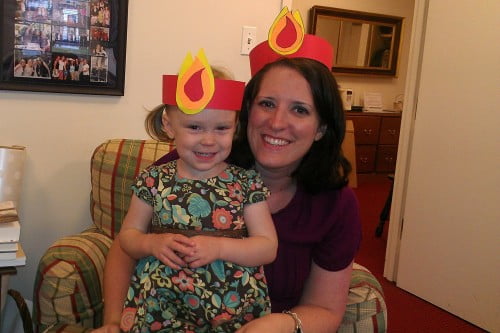 Today, as our summer Thursdays "Pentecost Possibilities" series continues, I'm glad to introduce my friend and colleague, Rebekah Hutto to the blog. She's a mother of Hannah Ruth as pictured to the left. Rebekah has allowed the Spirit to lead her to combine two of her favorite things-- children's books and the season of Pentecost into a writing project. I'm so glad to share her story with you here:
Today, as our summer Thursdays "Pentecost Possibilities" series continues, I'm glad to introduce my friend and colleague, Rebekah Hutto to the blog. She's a mother of Hannah Ruth as pictured to the left. Rebekah has allowed the Spirit to lead her to combine two of her favorite things-- children's books and the season of Pentecost into a writing project. I'm so glad to share her story with you here:
I’ve always been drawn to the illustrations and poetic words.
My mother, an early childhood educator, celebrated every important moment in my life with a different children’s book.
My office library is filled with as many, or maybe even more, children’s books as books on theology, church history, and the Bible. I use these books in teaching, preaching, and Bible study—children and adults alike are drawn to their images and rhythmic words.
As an ordained pastor, I have collected children’s books from many of the major Biblical stories: creation, Noah’s Ark, Moses, Jonah, and Jesus’ birth. But my favorite Bible story, the day of Pentecost, has been absent from the shelves. There are countless books on the life and ministry of Jesus, but children’s authors have often left out the ministry he gave to us in the Church.
The only places I’ve ever found the story of Pentecost for children have been in children’s Bibles. No one has really attempted to communicate this story to children through a picture book. And that’s a shame.
Maybe it’s because I love the color red and my red stoles are some of my favorite to wear. Or maybe it’s because I wish the Church was always as exciting, noisy, and unpredictable as in those first days following Pentecost.
I’m afraid that many of our mainline churches have lost this Spirit of creativity and have become fearful of the Holy Spirit’s often chaotic ways—chaos that our children often embrace.
We like things the way they’ve (allegedly) always been and hold to our traditions rather than the new thing God may be doing among us.
So I wrote a version for younger children, pleaded with publishers for a couple of years, and then finally signed a contract to publish it in 2015. I wrote this story because there are many aspects of it that make it exciting and full of drama.
The words convey anticipation, a hopeful waiting among crowds of people. Because this is the story of the Church’s birthday, it invites parties and celebrations. It also celebrates the third member of the Trinity, the Holy Spirit, and I want children to learn that the Spirit calls all of us, even the youngest among us.
Most importantly, in a world where cultures and people often clash, I want children to know about the multiculturalism and diversity of Pentecost.
One of my own issues with children’s literature is that too many of the faces are white, inadvertently teaching children that the Church is made up of a homogenous group of Caucasian people.
I was inspired to write the story of Pentecost to remind children that not only did God create a world filled with diversity, but also God’s Church should reflect creation’s diverse people—their talents, races, and languages. Because our churches do not always reflect this, when children learn about the diversity of Pentecost, they can begin to ask why their own congregations aren’t so diverse.
Maybe I’m an idealist, and this book and this story won’t shape children like I hope. But in my own childlike way, I dream of a church that is as exciting and Spirit driven as the one in the first days—and I think our children can show us this truth. After all, Peter preached, quoting from Joel, that men and women, young and old are called to prophesy, dream, and envision God’s Kingdom. I hope this book, and others that follow, can encourage our children to do the same.
Rev. Rebekah McLeod Hutto is a minister in the Presbyterian Church, USA. She currently serves as the Associate Minister of Christian Education and Discipleship at Brick Presbyterian Church in the city of New York. Her children's book "The Day When God Made Church" is being published by Paraclete Press and due out early in 2015.
On June 4th, Kevin celebrated his second anniversary as President and CEO of Feed the Children. It has been two years (gasp) since our lives as a family have been turned upside down by this opportunity to lead and serve. The people, the staff, the countries that have come into our hearts over the last two years have enriched our lives in ways more than one blog post can describe.
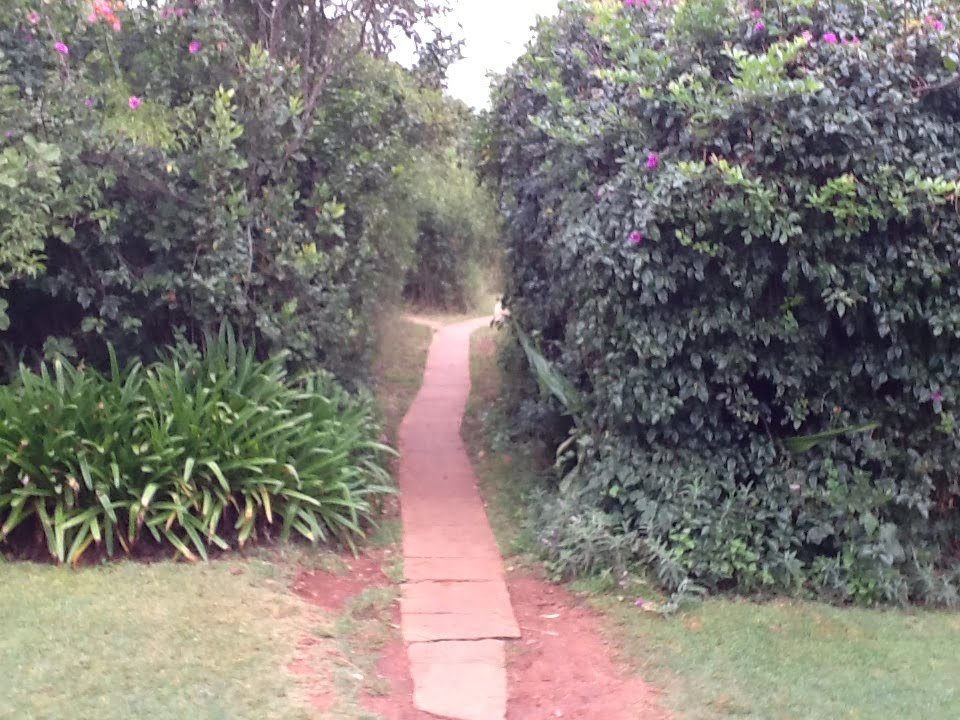
I've met faces like this from Kenya. 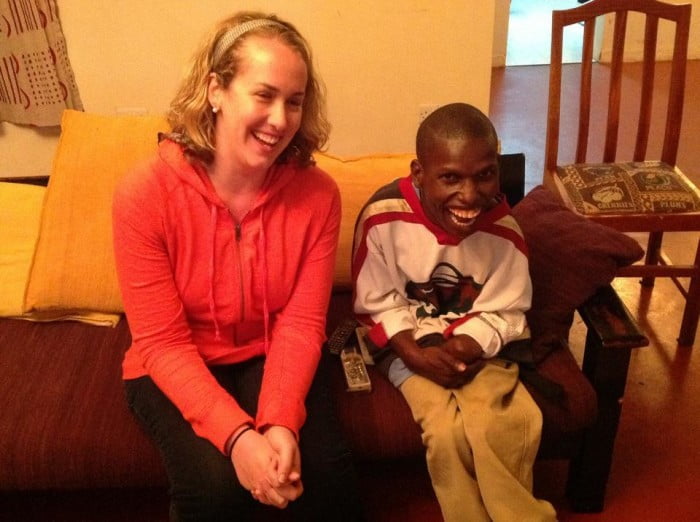 And these in the Philippines.
And these in the Philippines. 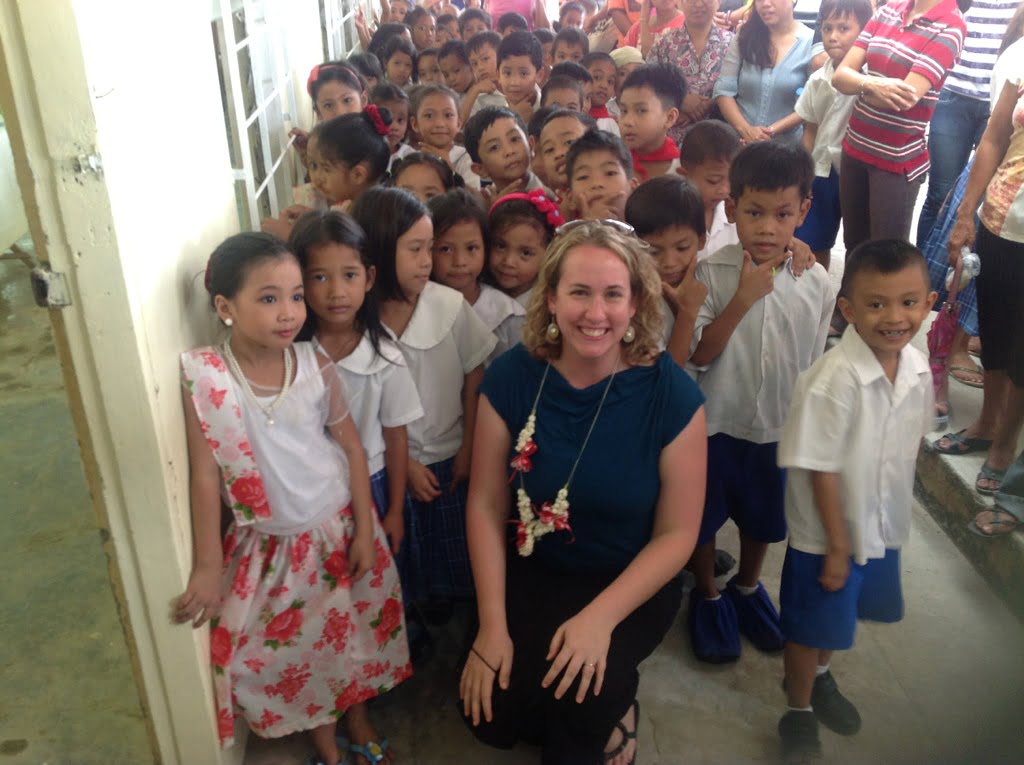 And these African babies.
And these African babies.
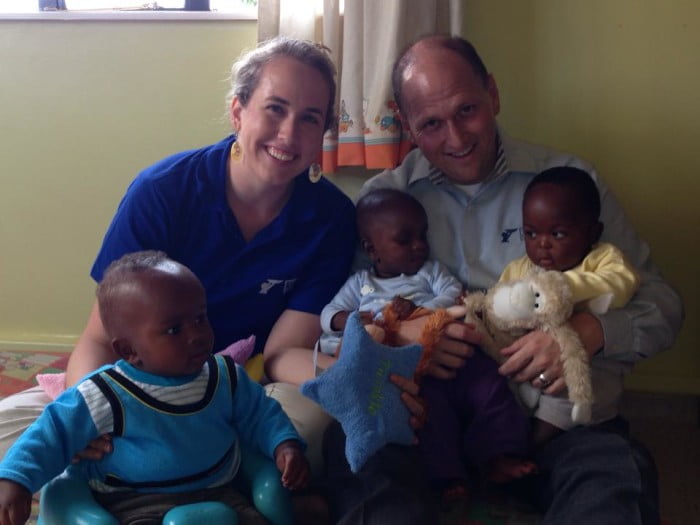 And speak to groups of children like this in Hawaii.
And speak to groups of children like this in Hawaii. 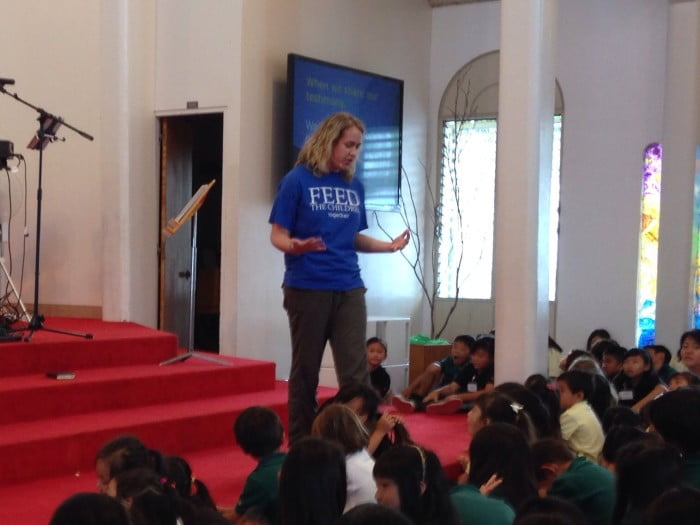 And this girl in Nicaragua.
And this girl in Nicaragua. 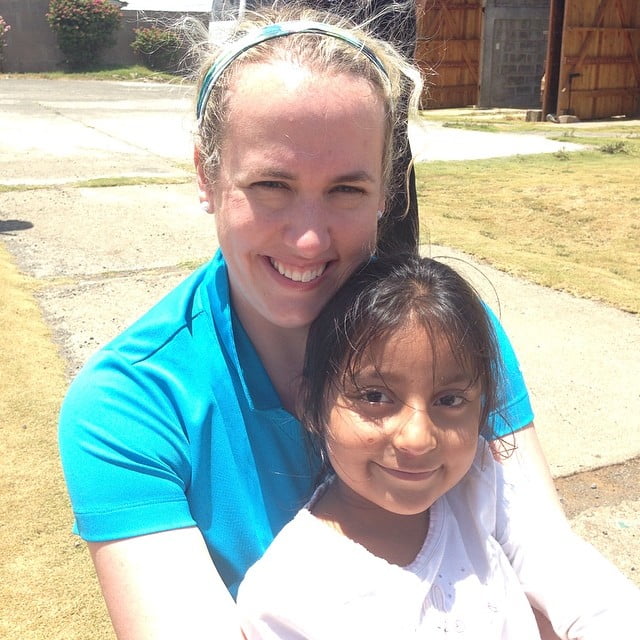
And been surrounded by children like these in Guatemala.

The children of the world, are beautiful, you know. How can your heart not melt? And overflow with gratitude?
This call came to Kevin but I've gotten to tag along for the journey and do what I can to help.
I've gotten to volunteer my time alongside writers like these to help better tell the Feed the Children story.  I've been able to host such saints of God-- who lead our international programs like these:
I've been able to host such saints of God-- who lead our international programs like these: And I'm so thankful for these faces and the beautiful memories that have been a part of these two years.
 One of my favorite children's books of all times is the Velveteen Rabbit.
One of my favorite children's books of all times is the Velveteen Rabbit.
But like most good children's stories, it's really not a children's story. It's a tale that has important things to say to adults trying to figure out the great question of: "How now shall we live?
The following scenario (that is one of my favorite) is a conversation between the Skin Horse, the most senior member of the children's nursery and Velveteen Rabbit about what is real:
“Real isn't how you are made,' said the Skin Horse. 'It's a thing that happens to you. When a child loves you for a long, long time, not just to play with, but REALLY loves you, then you become Real.'
'Does it hurt?' asked the Rabbit.
'Sometimes,' said the Skin Horse, for he was always truthful. 'When you are Real you don't mind being hurt.'
'Does it happen all at once, like being wound up,' he asked, 'or bit by bit?'
'It doesn't happen all at once,' said the Skin Horse. 'You become. It takes a long time. That's why it doesn't happen often to people who break easily, or have sharp edges, or who have to be carefully kept. Generally, by the time you are Real, most of your hair has been loved off, and your eyes drop out and you get loose in the joints and very shabby. But these things don't matter at all, because once you are Real you can't be ugly, except to people who don't understand.”
― Margery Williams
Many of us think we are real. We think we are living an authentic life.
But, we aren't actually real because our love has cost us nothing. Or it has cost us very little.
We aren't loving till we hurt. And by this I don't mean self-destructive pain. No, I'm talking about heart wide open living.
Think about it: when is the last time you cried tears over the suffering endured by a friend?
When is the last time you prayed for someone longer than a couple of seconds?
When is the last time you picked up the phone to just tell someone "I love you" them and were thinking about them?
Being real is about laying aside selfishness. Being real is about loving extravagantly. Being real is about not being afraid to love, even if you aren't loved equally in return.
But the pain. Oh, the pain. I wish being real did not come with so much pain! But it is does.
When we love deeply, we are also hurt deeply. There is really no way around it. It can feel like--
Friends who we thought would be in our life forever no longer talk to us.
Family members that we thought would always remember our birthdays no longer send us cards.
Colleagues who we thought we would work together with gleefully for years turn on us.
But this is what being real is all about-- having your hair loved off, your eyes popped out and your protective coverings looking sort of shabby. However, in the end, according to the Skin Horse it doesn't matter. We learn as we love that being real is one of life's greatest gifts.And those who can recognize the treasure we are and are becoming will find us. Our hearts will heal eventually. And the storehouse of experiences we've gathered through life's most authentic journeys will make us better people, more loving people.
But I still hate it when my heart breaks. I really do. But, I hope that I am becoming a little more real everyday.
Then will the eyes of the blind be opened
And the ears of the deaf unstopped.
Then will the lame leap like a deer,
And the mute tongue shout for joy. Isaiah 35:5 – 6
What does it mean to hope for a child whose prognosis is hopeless?
At our 20-week ultrasound appointment, my husband and I learned that our first-born son had a fatal birth defect. Somewhere in his earliest development, something had gone drastically wrong. Among other disabilities, his spine and skull had failed to close, leaving his brain tissue to be washed away by amniotic fluid rather than forming the intricate folds and connections that would allow him to see and hear and laugh and run. He would never gain consciousness and, without a functioning brain, his life would be very short. On that sunny May day, our doctors were gentle but firm: There was absolutely nothing that could be done – no surgery, no intervention, no treatment – that could save our son’s life. If he did not die before birth, he would die soon afterward. There was no hope.
We had waited for Ethan for a long time, through a whole year of early morning temperature readings and fertility charting, of monthly hopes and monthly disappointments.
The winter he was conceived we were studying the stories of the Sarah, Rachel and Rebekah in our Bible study group. Three generations of women all waited with this same longing, this same fear, this same hope.
The promise of God to create a people out of no people hung on the slender thread of a longed-for but unlikely pregnancy, generation after generation. Nothing they could do, or that we could do, could bring life into an empty womb. Only God could bring life out of barrenness.
When we realized that, finally, we were expecting a child, we knew his life was a gift from God, miraculous and undeserved. But now, our longed-for child, the one whose nursery we’d already planned, the one whose name we had already chosen, the one we had waited and prayed to welcome, was going to die.
I did hope for Ethan in those months of waiting for his birth. I hoped that he knew, in whatever way he could know, that he was deeply loved and cherished. I hoped that he was not in pain and that he would be spared suffering in his birth and death. I hoped to see him with my own eyes while he was still alive. I hoped that our friends and family would see his life as precious too. Those hopes were fulfilled on the day of his birth, as Ethan slipped into life and, two hours later, into death, surrounded by those who loved him.
But my gratitude for the fulfillment of those hopes did not take away the searing pain of all the hopes that would never be fulfilled.
One of the first Sundays after Ethan’s birth and death, I stood in church next to my husband as our congregation sang a song based on Isaiah 35: “Through you the blind will see, through you the mute will sing, through you the dead will rise…” we sang. Tears ran down my face.
What I heard in those words was a wild, unbelievable promise for my boy – that his beautiful feet would yet dance, and that his blue eyes would one day see, that his tiny red mouth would laugh and sing. It’s a promise as implausible as the promise that Sarah would conceive in her old age or that Mary’s baby would free her people from oppression for all time. It’s a promise for everyone who, like Ethan, is at a dead end, whose life is hopeless. Without the life-giving touch of God, there will be no life. But with God’s life-giving breath, anything is possible.
The promise and longing of Advent is that we wait for the day when every hopeless, barren dead-end in all creation will be filled with the breath of life. We wait for the day when we will feel a leaping within us, like the baby in Elizabeth’s womb, and know that it is the Holy Spirit, filling the creation with new life. These days of waiting are not unlike the days of my pregnancy with Ethan, as we grieve with shattered hearts for what will not yet be, and long together for what God has yet to breathe into being.
Let us pray:
Come, Lord Jesus, and breath your breath of life into all our hopeless, barren dead-ends. Fill us with the quickening of your Spirit. Amen.
Dayna is a member of Durham Mennonite Church (Mennonite Church USA) and part of the Rutba House new monastic community. She and her husband Eric live in the Walltown neighborhood of Durham, NC and are parents of one living son, Noah. Their firstborn son, Ethan, was born and died in 2009. Dayna is hoping this Advent for a heart open to God’s longings for the most vulnerable among us.
 In a couple of days my Kenyan adventures will be over-- for this time around-- and when I think of the word that comes to mind, all I am still stuck with is JOY.
In a couple of days my Kenyan adventures will be over-- for this time around-- and when I think of the word that comes to mind, all I am still stuck with is JOY.
How in a country with so much need, so much poverty, so much corruption can there be joy?
How in a line of work with so many motherless children and hungry mouths to feed can there be joy?
How in place where getting even the simplest of tasks accomplished takes SO long can there be joy?
But, JOY abounds here.
There has been joy in hearing the children at the orphanage learn more bits and pieces of English and shouting my name as I play with them on the playground "Elizabet, Elizabet!"
There has been joy in remembering that life is indeed about simple pleasures like a cup of tea, the ability to walk the stairs (even to the 8th floor), laugher when bumpy roads make the journey all the more interesting.
There has been joy in the deep waters of relationship-- feeling included, accepted and challenged along the way.
In this joy, I have felt a part of such a larger family-- a African family, a Kenyan family, even though my skin is white.
I have tasted the delight that is dessert at the end of the day-- eating it because it's too sweet of a moment not to indulge.
I have seen with my own eyes the beauty that is children feeling noticed by just one person-- human heart to human heart.
There's something about Africa that always stirs my soul and for this reason I haven't been able to do anything less than wake up here with a huge smile and a prayer, saying to God (in the spirit of the writer Anne Lamott): "Thank you, thank you, thank you."
Joy has come to me this week in cupfuls, bowlfuls and more than I can even take in. My spiritual bags are quite overflowing as I start to pack. And so I testify- taste and see that the Lord is good!
I've been in Kenya for over five days now-- and all I can say is that even with difficulties (there have been some)-- this place causes joy to rise up for me. It's hard not to keep smiling!
What I mean by joy is not just happiness (though there has been that too), but what that soars, what is deeply anchored in the soul of things, and what opens eyes to the larger picture of what God is doing in this world and what the words of Jesus are truly all about.
Words like:
Blessed are the poor in spirit,
for theirs is the kingdom of heaven. . . .
Blessed are those who are persecuted because of righteousness,
for theirs is the kingdom of heaven.
For our eyes have tasted this kind of blessing over these past days and we couldn't feel more inspired to be do this kind of work. We've experienced the blessing of being in the place where we are to be for right now. And even when there are moments of sadness, moments of questioning like "Why does the world have to be so unjust?" (we've seen lots of this too), it's a beautiful kind of living to be here.
Blessings like having beautiful orphans wrapped around your legs and arms, allowing you to love on them:
Blessings like singing Christmas carols with young men with developmental disabilities with smiles bigger than you've ever seen on their face or yours either:

Blessings like watching kids who don't normally get Christmas presents discover the joy of blocks and bubbles:

Blessings like watching the very best Christmas play ever with some of the most beautiful actors you've ever seen:
We are so happy to experience joy looks that looks like this.
Some school children in Edmond, Oklahoma wrote these notes to be put in a disaster relief box given out by Feed The Children this week. Words to live by:
At the end of the day, no matter where in the world you are, there's one thing that always makes kids excited: the candy. Even the big kids like my husband . . .
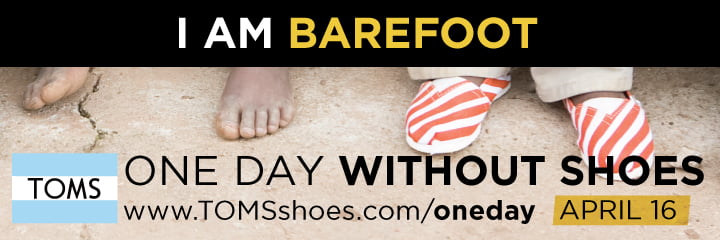
Today, I am participating with my friends at Feed The Children in their pledge to go one day without shoes. It's a cold day in Oklahoma and I have missed wearing shoes for sure, especially when an errand I needed to do took me on the streets of downtown OKC.
It's an emphasis begun by one of Feed The Children's partners, TOMS shoes to raise awareness about childhood poverty around the world and what it would be like to be even without the most basic life necessity: shoes. Feed The Children is participating, staff-wide for the second year now.
We were invited to write a name of a child on our feet-- as a way to walk in solidarity with them for the day. I chose Dorcas, a little girl from the area of Tumaini, Kenya.
Dorcas is an 10-year-old girl who lives in a community without running water. Her home does have electricity for which she is thankful. She contributes to her home by carrying water/ wood, cleaning and caring for her younger siblings. Her favorite color is red and her favorite food is rice. Dorcas hopes to become a teacher when she grows up.
Consider sponsoring Dorcas or a child like her (as Kevin and I have done) through Feed The Children's child sponsorship program. You'll ensure she never goes a day without shoes again.
Or, consider buying a pair of TOMS shoes, knowing that as you do a pair will be donated because of YOU to a child in need (and many of these kids are participants in Feed The Children's programs!)
I can't help but be reminded on this day as I participate with countless others in this emphasis of Isaiah 52:7: "How beautiful on the mountains are the feet of those who bring good news, who proclaim peace, who bring good tidings, who proclaim salvation, who say to Zion, "Your God reigns!"
Bringing shoes to kids in need is good news indeed! Thanks TOMS for your leadership in this great effort.


Excuses Series: I’m Not Smart Enough--Mark 9:30-37
Have you ever found yourself in a situation or a conversation with someone and have wanted to throw up your hands and say, “This is all just over my head. What you are saying is beyond me!”
 Maybe this was a time you were in Algebra in high school and your teacher put up the formula, x+y= ? and pointed to you for an answer. The clueless look on your face said it all. “I’m not smart enough to answer that. Math is just not my thing. Could you ask someone else?”
Maybe this was a time you were in Algebra in high school and your teacher put up the formula, x+y= ? and pointed to you for an answer. The clueless look on your face said it all. “I’m not smart enough to answer that. Math is just not my thing. Could you ask someone else?”
Maybe it was a time when you moved to a new place—a place where the primary language was not the one you learned since childhood. Someone directs their attention to you, seeking to have a rapid fired conversation and all you can say with the confused look in your eyes, “I’m not smart enough to understand you. Could you please just talk to someone else?”
Maybe it was a time when you found yourself at a dinner party with some well-educated folk. Before too long the conversation goes in the direction of topics or current events to which you know nothing. When it seems to be your time to contribute, your dazed expression says back to the group, “I’m not smart enough. Could we please just talk about something else?”
In all these situations and countless others that you and I could encounter in a given week, the most human response is silence. We are people who disengage when we don’t understand something. Our excuse that keeps us from greater depths of relationship or knowledge is simply, “I am not smart enough.”
In the same way, in our gospel lesson for this morning, we encounter a group of Jesus’ disciples who were also fans of using the excuse, “I’m not smart enough” when the cost of discipleship intensified. They too allow silence to be their response.
And this is the scene: Jesus has just returning from a long trip to Caesarea Philippi has come home to Galilee—Capernaum to be exact, the only place throughout the gospels where Jesus is known to have had a house during his entire three-year ministry. Jesus’ ministry is climaxing. Like the moment the dramatic music begins to play in the middle of a movie, signaling “now is the time to pay attention” (can you hear it now?) so to was Mark 9’s place in the larger plot.
Jesus knows that his time on earth will so be coming to a close. He needs his disciples to not only to be prepared for all that is to come, but also to see things more clearly. Previously, Jesus had asked Peter, “Who do you say that I am?” Peter’s answer of “You are the Christ, the son of the Living God” had shaken the foundations of this ministry. But, there was more. This was it (look with me at verse 31): “The Son of Man is to be betrayed into human hands, and they will kill him, and three days later after being killed, he will rise again.”
And is the case with Jesus, every moment was a teachable experience, every moment was an opportunity to life to life to fullest—to help his followers truly understand what life in the kingdom of God was really like.
But, like a tough Algebra lesson or an over intellectualized dinnertime conversation, verse 32 tell us the disciples’ response, “But they did not understand what he was saying and were afraid to ask.”
Jesus, you see, had just let them in on the future and the glory of all that was to come, but what do they do? They SAY NOTHING. Their silence speaks to their excuse of—“We’re not smart enough.” And by this I mean, not that the disciples had mental or intellectual challenges or disabilities, but that they allowed their own fears of the unknown to keep them from going the next step in their relationship with Jesus. They held on to the crutch of the excuse of, “Whoa, wait a minute Jesus . . . what you’ve said is just a little too much for us. We just started to love you and commit to follow you for the rest of our lives and now you tell us that you are going to die and then rise again. We just don’t comprehend.”
The problem wasn’t the confusion. It wasn’t even the lack of understanding. It was the ego. It was the disciples being too fearful of what others might have thought of them that they wouldn’t even ask their questions aloud. Fear held them back.
Jesus, I believe, would have had no problem entertaining their questions IF they’d only been courageous enough to say them.
Instead, the disciples opted for another way. They clung to these pristine images of themselves—as the chosen, as the put together ones, as the ones who were of course smart enough to know everything that they already needed to know that they said nothing. They couldn’t dare ask Jesus a question because what if they admitted their doubt, what would this say about them? (Met someone like this in church lately?)
As we keep on reading, it all becomes plain to us. Because when the disciples and Jesus finally got to Capernaum, Jesus takes them aside. “Hey boys, what have you been fusing about with one another on the way?” Though they’d not fess up to it (again there’s silence) scripture tells us that they’d been busy debating who among themselves who was the greatest.
Can stop right here and call out the ego once again?
This band of travelers were so concerned about where they fell in rank, how folks around them sized them up, and how important they seemed in the mix in the end that such sentiments led to an argument. Their greatest concern was looking bad in front of Jesus.
No wonder then, when Jesus is giving them such a “come be part of my life, my future, and see me for who I really am” kind of moment that thy let the excuse of “I’m not smart enough get in the way.” For, they were embarrassed to be seen as they really were—scared, confused and clinging to the excuse of not wanting to seem less than.
Because in the end, it didn’t matter, to Jesus how intellectual they were. Or what they did or did not understand. Rather, it was if they brought their whole selves to God—their doubts, their fears, their questions. Because if they brought all of this to God Jesus was able. He was able to transform their doubts to faith, their fears to belief, and their questions to life-sustaining peace.
 In fact, Jesus takes this conversation one step further—giving the example of including children in worship by calling over a small one in this teachable moment. Jesus declares in verse 37: “Whoever welcomes one such child in my name welcomes me, and whoever welcomes me welcomes not me but the one who sent me.”
In fact, Jesus takes this conversation one step further—giving the example of including children in worship by calling over a small one in this teachable moment. Jesus declares in verse 37: “Whoever welcomes one such child in my name welcomes me, and whoever welcomes me welcomes not me but the one who sent me.”
Or, in other words—hey, boys, take some lessons from the children. Maybe you don’t need to worry so much about who is the greatest or where you rank. Just be.
Several weeks ago when Kevin and I were in Africa with Feed The Children, we had as you might imagine countless opportunities to spent time with and observe communities of children. On our first full day in Nairobi, Kevin and I along with the rest of the staff in the US delegation spent time at the Dagoretti Children’s Center—an orphanage run by Feed the Children for those who have been abandoned by their parents. The children, who live there, though faced with great pains of wondering why their parents abandoned them as they grow up, are among the lucky ones. They are fed, clothed, and loved unconditionally by a staff of committed caregivers. According to the World Food Program statistics, a developing nation like Kenya, one in four children are underweight due to malnourishment. Children under 5, are regularly not feed properly because their families fear these babies won’t make it to their 5th birthday (so why bother to share such valuable resources with them?).
It’s truth to say that children are vulnerable.
But it’s also truth to say that children can be some of our greatest teachers—for they tell us the truth.
So, on the day that Kevin and I were touring the Center, we spent some time playing with the children around the center. However, as Kevin made conversation with his usher for the day called Moses—an elementary school aged boy at the center whom had been assigned as Kevin’s buddy for the event, Kevin asked him what he thought of the food we had for lunch. Kevin thought he was just making conversation with the child, asking what he thought would be a simple question with a simple response of something like, "I like it very much." But instead, he heard about how slow he felt the kitchen staff were in bringing out the food and wasn't as good as it used to be, much to the embarrassment of the center director. But children can not be controlled as any parent knows-- they say what they feel. (We later learned that this child only recently started attending American school where he'd grown accustomed to the pace of life being much faster than African standards).
I think this kind of honesty in our vocalizing our thoughts—though it may be shocking to our adult sensibilities is exactly what Jesus was getting at when he encouraged the disciples to welcome the children.
Didn’t Jesus also once say that “whoever finds his life will lose it, but who whoever loses his life for my sake will find it?”
Or in other words—we can’t be people who are so concerned with saving face that we miss out on the peace, the joy, the hope that only Jesus can bring to our souls. We can’t be so concerned with looking stupid by asking questions that we don’t speak up. We can’t be so concerned about what our neighbor in the pew sitting next to us would think if we truly got into the quietness of the prayer time or the hymns that we are kept from worshipping.
Because truly, today’s gospel lesson asks us how it is that we are going to deal with the big questions of life. Are we going to be held back by our egos? Or are we going to tell the truth about what we think, where we are, what we hope for and what we most need? And if we are going to do this, we have to start asking some better questions--
Anne Lamott, one of my favorite writers and spiritual teachers says: “Your problem is how you are going to spend this one and precious life you have been issued. Whether you're going to spend it trying to look good and creating the illusion that you have power over circumstances, or whether you are going to taste it, enjoy it and find out the truth about who you are.”
So, what about you today—are you going to be silent? Are you going to shuffle around trying to find your rank among your peers—hoping that you are the top of the list, the greatest if you will?
Or are you going to trust in Jesus to work out what you can’t—what you can’t understand, what you do not know (and may never know)? Are you going to speak up and as God the big questions when you need to?
Questions like: why do children suffer in this world? Why do good things never seem to happen to me? Why doesn’t my husband seem to love me anymore? Why can’t I seem to find a good job? Why do I not feel your presence, God when I pray? Why can’t you make my wife, God, come to church with me? Faith, I just don’t understand how you get it, God! And the list could go on and on. God can take our questions—any of them—there’s no shame in simply asking!
Today, let our excuse of “I’m not smart enough or I’m don’t understand” not hold us back any longer to the relationship that our Lord has for us today and for all the days to come.
AMEN